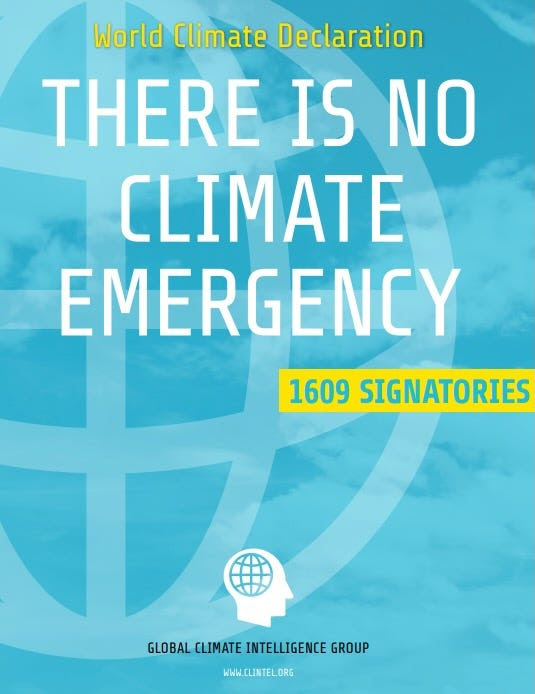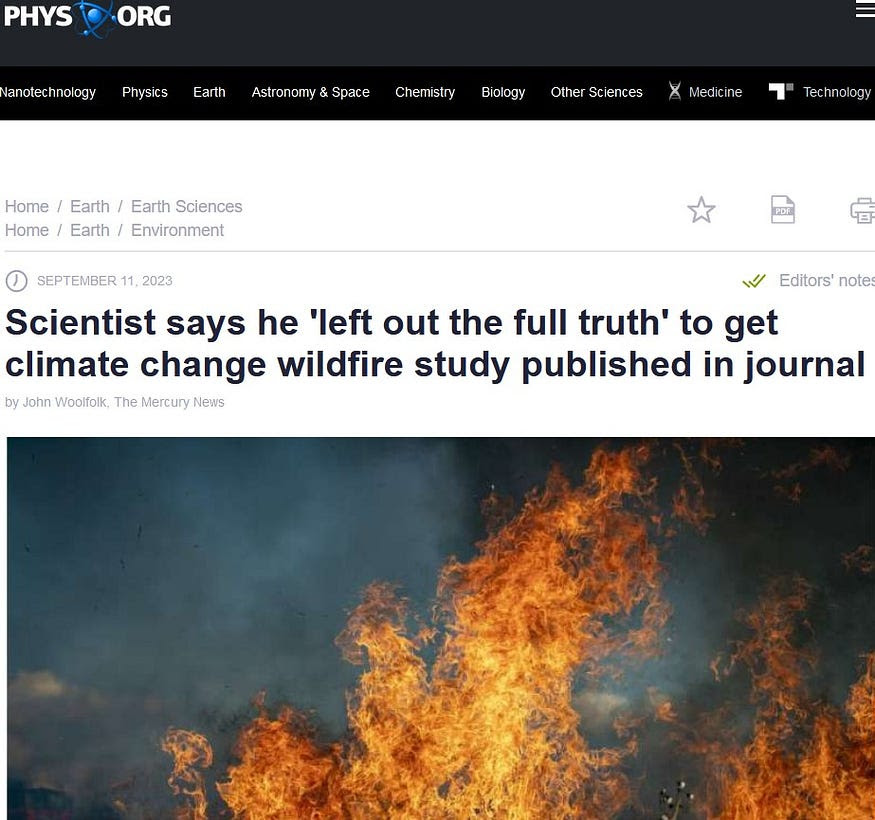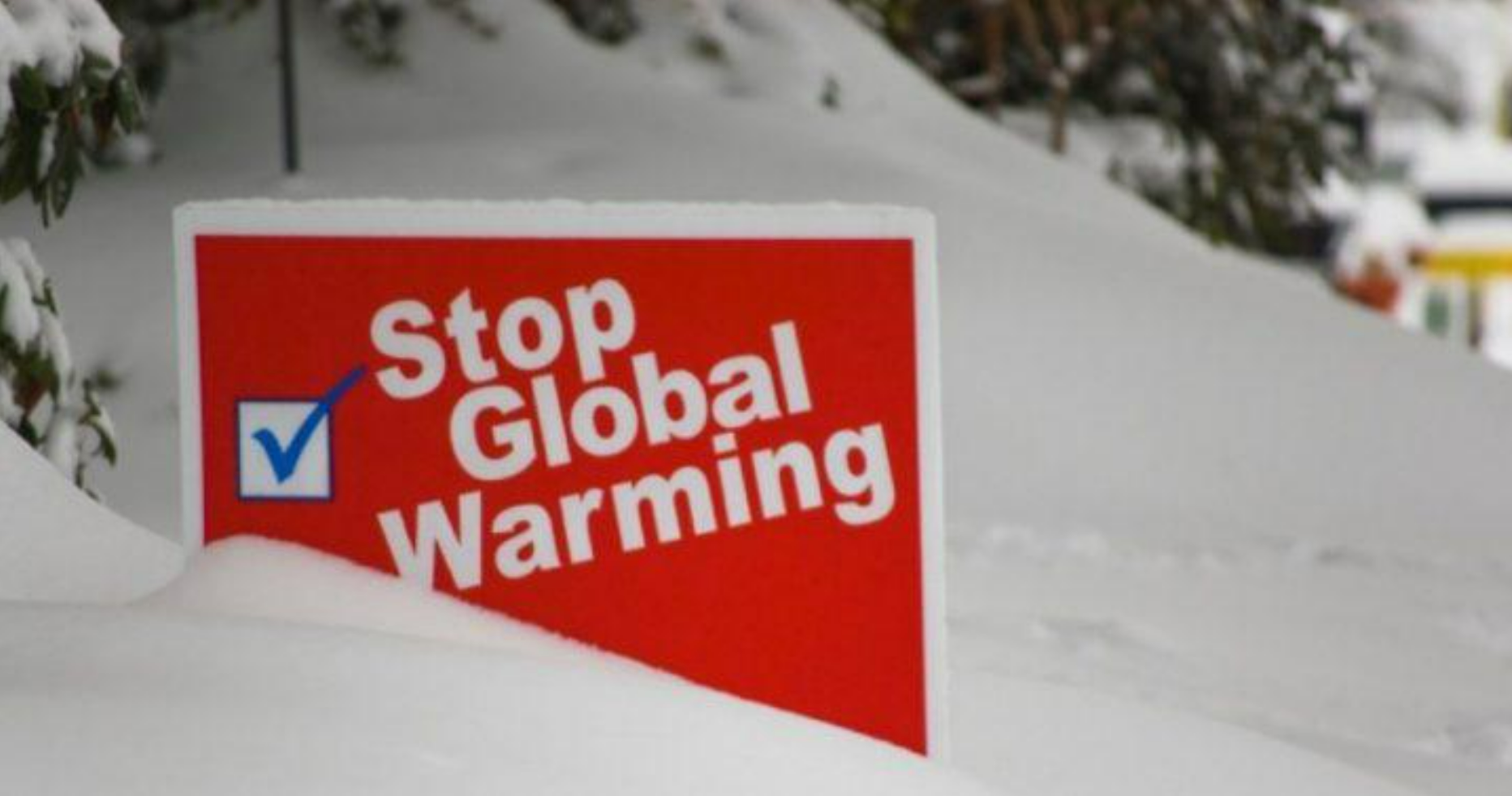Climate scientist Judith Curry, a former chair of the School of Earth and Atmospheric Sciences at the Georgia Institute of Technology, has been among the leading voices warning that the Earth is facing an “emergency” due to alleged “man-made climate change.” In recent months, the mainstream media’s apocalyptic warnings of a “climate crisis” have increased dramatically.
The climate science establishment and the mainstream media talk about how “climate change” is a “crisis,” that there is an “overwhelming scientific consensus,” and that anyone who dares to question this is a “conspiracy theorist” and global warming denier.
Scientist Curry became a fixture of climate alarmism and was even hailed like a superstar among climate activists after she published a study claiming to have found a doubling of severe hurricanes. This was eagerly shared by hysterics and mainstream media. “I was adopted by the environmental advocacy groups and the alarmists and I was treated like a rock star,” Curry recounts in a recent interview.
“Flown all over the place to meet with politicians.”
Some researchers, however, approached Curry and pointed out methodological errors in her work — whereupon she devoted herself to comprehensive reexaminations once again and finally determined: The objections were justified. She turned out to be an unusual researcher who took criticism seriously and concluded, “They had a point.”
Moreover, in the wake of the 2009 Climategate scandal (when it came out that almost all data was kept under wraps that did not point to a global climate apocalypse), Curry had to realize that alarmists are not really open to criticism and instead try to avoid releasing unwanted research data or data that does not fit the narrative. They don’t even shy away from having editors fired.
Since she dared to criticize the system, however, she has been regarded as a corrupter of her profession and is shunned by the mainstream media.
The climate change industry is blossoming
In a recent conversation with the New York Post, she admits that the “science” was fabricated to scare the public into believing we need to fight a “climate emergency.” She explained, it’s a “manufactured consensus.”
Overall, the scientist recognized that there is now a veritable “climate change industry” that rewards the shrillest possible alarmism and ignores more serene to disarming results. This cartel can be traced back to the United Nations Environment Programme (UNEP).
“The origins go back to the…UN Environment Program,” Curry says. Some United Nations officials were motivated by “anti-capitalism,” she revealed. “They hated the oil companies and seized on the climate change issue to move their policies along,” Curry explains. U.N. Secretary-General Antonio Guterres, former Portuguese Socialist Party prime minister, even recently claimed that “the era of global warming has ended” and “the era of global cooking has begun.”
Lucrative careers for climate alarmists, little research funding for sober, ethical scientists
Curry soberly notes that the problem with current climate research is not only that skeptics find it difficult to get government funding; even if they do, they have a much harder time getting their research published — because the editors of the journals are now also consistently alarmists who have declared the debate “over” and man-made global warming dogma. Today, if you want a big lab and a big salary at a prestigious university, there is only one clear way to get there: join the panic orchestra of climate apocalyptics, she explains.
She also reveals that scientists pursue incentives of “fame and fortune” that lead them to exaggerate or even fabricate the alleged risks. According to Curry, one of the easiest and most effective ways for climate “scientists” to gain “fame and fortune” is to make false claims linking weather to “global warming.”
Curry knows exactly how the “climate science” industry works, having herself spread “global warming” hysteria. She herself became a darling of the corporate media after publishing her hurricane study.
“We found that the percentage of category 4 and 5 hurricanes had doubled,” Curry says. “This was picked up by the media,” and then climate alarmists realized, “Oh, here is the way to do it. Tie extreme weather events to global warming!”
The “more intense” hurricanes she reported in her findings quickly boosted alarmists. But when her work gained worldwide recognition after being linked to “climate change,” Curry admitted she enjoyed the ride on the green agenda.
Then the Climategate scandal taught her that other climate scientists were not so open-minded. The aggressive attempts by alarmist scientists to hide data suggesting that climate change is not a crisis were revealed in leaked emails.
Curry said alarmist scientists have been willing to do “ugly things” to push their politically-motivated narrative about global warming. The infamous “Climategate scandal” revealed that some scientists were hiding data and privately admitting in leaked emails that the Earth isn’t in a climate crisis.
“Ugly things,” says Curry. “Avoiding Freedom of Information Act requests. Trying to get journal editors fired.” Curry says there is “climate change industry” that rewards alarmism.
In 1988, the UN established the Intergovernmental Panel on Climate Change (IPCC). “The IPCC was not supposed to focus on the benefits of warming,” Curry explains. “The IPCC’s mandate was to look for dangerous man-made climate changes. That’s where the national funding agencies directed all the funding, assuming there were dangerous impacts.”
The researchers quickly found that you only get money if you make alarmist claims about “man-made climate change.” In this way, an “artificial consensus” is created. Even if a skeptic gets funding, it’s harder to publish because journal editors are alarmists.
“If you wanted to advance in your career, say at a prestigious university, with a big salary, big lab space, lots of grants, and running an institute, there was only one way.”
That’s exactly what we have now: a massive, state-sponsored climate alarmism complex. Claims of a “climate crisis” are being spread around the globe by Western governments and their media accomplices to meet the green agenda goals of the World Economic Forum (WEF), the United Nations (UN), the World Health Organization (WHO), and other unelected globalist organizations. To achieve these goals, the plan is usually to drastically reduce the quality of life for most people while raising taxes. In the process, people are appealed to make these sacrifices in order to “save the planet.”
Are more courageous scientists willing to risk their careers and stand up for the truth?
Curry is not the first renowned scientist to speak out. “The media portrays climate scientists as having made a final judgment on global warming,” Business Insider wrote back in 2009, adding, “They haven’t,” and introducing a number of dissenting scientists, a group that is likely to grow in the face of mounting evidence that man-made global warming is proving to be an unsubstantiated claim.
In fact, a global network of 1609 scientists and researchers reassures, “There is no climate emergency.” And as one would expect, the recently published all-clear from the Global Climate Intelligence Group (Clintel) has been hushed up by the media, even though the network is backed by respected researchers and experts from around the world.

The climate models on which the warnings are based are implausible, these scientists say. The outcome of the models is determined by the input, they say. To put it casually, “garbage in, garbage out.” Climate science has thus long since degenerated into a discussion based on beliefs rather than on solid, self-critical research.
Consensus of opinions versus scientificity
Proponents of global warming from man-made CO2 often claim that it is “accepted science” as almost all scientists agree that global warming is real and the result of human activity. The minority of scientists who disagree, like Judith Curry, are shunned and isolated.
For example, NASA stated in an official statement, “The vast majority of actively publishing climate scientists — 97 percent — agree that humans are causing global warming and climate change.” Cornell University even says more than 99.9% of peer-reviewed scientific papers came to the same conclusion.
Politicians, climate activists, and the media point to the percentage of scientists who hold this consensus view. But this is unnatural for the natural sciences. In politics and in associations, voting is common and useful. Those who speak of voting mean a conviction or belief, not a confirmation by experiment or observation.
Michael Crichton, who graduated from Harvard Medical School, gave a lecture on science, politics, and consensus at the California Institute of Technology in 2003 where he stated:
“I regard consensus science as an extremely pernicious development that ought to be stopped cold in its tracks. Historically, the claim of consensus has been the first refuge of scoundrels; it is a way to avoid debate by claiming that the matter is already settled. Whenever you hear the consensus of scientists agrees on something or other, reach for your wallet, because you’re being had.”
And he continues:
“Let’s be clear: the work of science has nothing whatever to do with consensus. Consensus is the business of politics. Science, on the contrary, requires only one investigator who happens to be right, which means that he or she has results that are verifiable by reference to the real world. In science consensus is irrelevant. What are relevant are reproducible results. The greatest scientists in history are great precisely because they broke with the consensus. There is no such thing as consensus science. If it’s consensus, it isn’t science. If it’s science, it isn’t consensus. Period.”
The predictions of the Intergovernmental Panel on Climate Change (IPCC) and the 97 or 99.9 percent have always proven to be wrong. Below is one of the comparisons of the IPCC model (red line) with measured reality (blue line).
Based on statements by climate scientists, politicians Al Gore and John Kerry (pictured below) predicted in 2009 that the polar ice caps would be gone by 2013, triggering a climate collapse. This kind of climate alarmism helps the climate industry by pouring billions of taxpayer dollars into its coffers.
Dr. John Clauser, Nobel Laureate in Physics (2022), criticized the “pseudoscience of climate” and accused the IPCC of spreading disinformation at a scientific meeting in Seoul in 2023 under the auspices of the South Korean Ministry of Science.

Climate scientists must spread climate alarmism expected by science magazines to get published
American climate scientist Patrick Brown described in an online post in September 2023 how he manipulated a study on forest fires. He had overemphasized the influence of global warming on fires and ignored other causes. In this way, he said, he wanted to ensure he could publish in the prestigious journal Nature.
Brown lamented that scientists who want to succeed with their research must serve the narrative of dire global warming. “Climate science has become less about understanding the complexity of the world and more about serving as a kind of Cassandra, urgently warning the public about the dangers of climate change.”
Is climate „science“ influenced by powerful vested interests?
The climate industry has become very lucrative and has developed rapidly — from photovoltaics to heat pumps — and the market is now so large that it’s hard to keep track of it all. One pioneer who helped create the market in the first place is Al Gore. The former U.S. vice president founded a “green investment firm” after his election defeat to George W. Bush. It is now worth $36 billion.
To cite another example: Google co-founder Sergei Brin and UN climate ambassador Leonardo DiCaprio are investing with the biggest venture firms and asset managers in factories that grow burgers and steaks in a petri dish or produce chicken. Again, the rationale is that this will save the climate because it prevents the production of greenhouse gases by animals (including chickens?). The fact that this industrial laboratory meat farming uses more energy, pollutes the environment, and the junk food produced is harmful to health goes unmentioned.
It goes without saying that these economically powerful and influential forces play a major role in shaping the “scientific” discourse on climate change.

